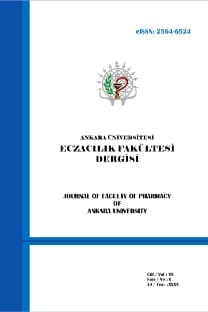Elazığ ve Malatya illerinde eczacıların acil kontrasepsiyonla ilgili bilgi düzeyleri
Eczacılar aile planlaması ve acil kontrasepsiyonda önemli bir yere sahiptir.Bu çalışmanın amacı Elazığ ve Malatya illerinde eczacıların acil kontrasepsiyon ile ilgili bilgi düzeylerini ölçmektir. Elazığ ve Malatya illerinde toplam 190 eczane bulunmaktadır. Çalışmada örnekleme gidilmemiş, bütün eczacılara ulaşılmaya çalışılmıştır. Eczacılara iki bölümden oluşan anket formu uygulanmıştır. Birinci bölümde sosyo-demografik özellikler ile ilgili ifadeler, ikinci bölümde eczanede bulunan aile planlaması yöntemleri, ertesi gün hapı ile ilgili eczacıların bilgi düzeyleri ve düşüncelerini ile ilgili sorular ve eczacıların aile planlaması yöntemleri ile ilgili kendilerini değerlendirdikleri ifadeler bulunmaktadır. Tekrarlayan ziyaretlerle eczacıların 154’üne ulaşılmıştır. Eczanelerin % 85.1’inde hap ve kondom, % 74.7’sinde ertesi gün hapı bulunmaktadır. En çok talep edilen yöntemler hap (% 79.9), kondom (% 59.1) ve ertesi gün hapıdır (% 35.1). Eczacıların % 96.8’i acil kontrasepsiyonla ilgili bilgi sahibi olduğunu, % 90.9’u eczanelerinde ilacın bulunduğunu belirtmiştir. Acil korunmada kullanılan ertesi gün hapının içeriğinin doğum kontrol hapları ile aynı olduğunu söyleyen eczacıların oranı % 15.4’tür. Bu yöntemle korunmasız cinsel ilişki oranının artacağını düşünenlerin oranı % 68.2’dir. Ertesi gün haplarının ne zaman alınacağına doğru cevap verenlerin oranı % 55’tir. Eczacı olarak çalışma süresi arttıkça hapların ilişkiden ne kadar süre sonra alınabileceğine verilen doğru cevap azalmaktadır (p<0.05).Serbest eczacıların bu hapları eczanelerinde satmalarına rağmen bilgi düzeyleri düşük bulunmuştur. Eczacılara danışmanlık becerilerini artırıcı eğitimler planlanmalıdır
THE KNOWLEDGE LEVEL OF RETAIL PHARMACISTS IN ELAZIĞ AND MALATYA ON EMERGENCY CONTRACEPTION
Pharmacists have a key role in family planning and emergency contraception. The aim of this study is to determine the knowledge level of pharmacists in Elazığ and Malatya on emergency contraception. There are 190 pharmacies in Elazığ and Malatya. In this study no sampling technique was used, instead it was aimed to reach all the pharmacists. Pharmacists were given a questionnaire having two sections. In the first section, there are statements related to socio-demographic characteristics and in the second section there are questions including knowledge levels and opinions of pharmacists relating to family planning methods and emergency contraceptive pills (ECP) available in the pharmacy and there are statements in which pharmacists asses their knowledge of planned parenthood methods. 154 pharmacists were reached with the help of repetitious visits. The average age of pharmacists included in the study was 37.70±10.20 and working years pharmacists were 12.28±8.98. % 52.6 of the pharmacists was male and, % 59 of them was married. Pill and condom % 85.1 and ECP % 74.7 were available in the pharmacies. The most demanded methods were pills (% 79.9), condoms (% 59.1) and ECP (% 35.1). % 96.8 of pharmacists stated that they have knowledge on emergency contraception and % 90.9 of them stated that they have ECP in their pharmacies. The rate of the pharmacists stating that the component of the ECP used in emergency contraception is same as birth control pills was % 15.4. The rate of pharmacists answering correct to “when to use ECP” is % 55. The more working years pharmacists have the less correct answers are given to the question of “how soon ECP can be taken after the sexual intercourse” (p<0.05). The knowledge level of retail pharmacists was found to be less although they sell these pills in their pharmacy. Training aimed to improve the counseling skills of pharmacists related to this topic should be planned
